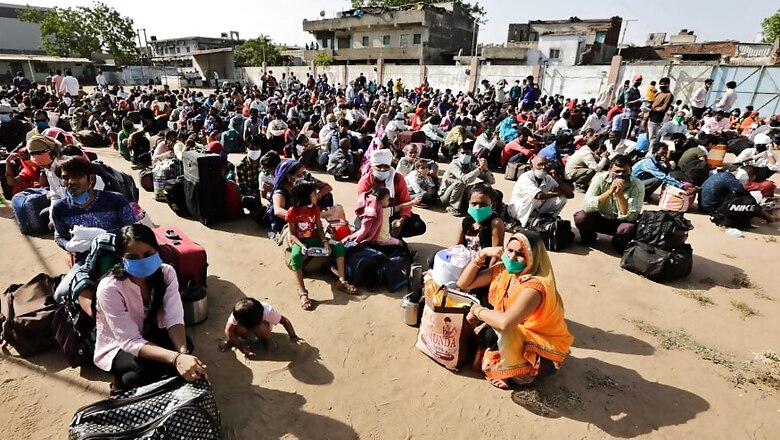
views
The pain and suffering of lakhs of migrant labourers — marching hundreds of miles to reach their native places with scant belongings and scanter provisions — are heartrending by any reckoning.
The images in the media and social media, the scenes I witnessed first-hand, the stories we all heard about the hardships and misery of the walking masses, the odyssey of a moving humanity — these will remain etched in my memory. Whodunit?
It is easy to blame the Narendra Modi government for the lockdown decision with a four-hour notice, and the manner of its implementation. But at that time, almost every expert was clamouring for shutting down the country. Besides, there was a lot of scaremongering. Any other government, too, is likely to have taken the same decision.
I believe that the lockdown decision was bad and it has done more damage than good, but my view is beside the point. The question we need to ask here is: did the people who were the worst-affected by the decision — migrant labourers and casual workers — have any say in it? The answer is a big ‘no.’
And this answer raises several, more fundamental questions. Why didn’t anybody from or representing the unorganised sector have anything to contribute to one of the most important decisions taken in independent India? Is this how a democracy, the world’s largest to boot, work? Whatever happened to responsiveness? And, more importantly, representativeness?
All questions have one answer: most segments of civil society have been captured by political parties. Whether it is trade unions, farmers’ bodies, students’ and teachers’ associations, or women’s groups, the leadership is in the hands of people who are affiliated to major political parties. Consequently, such organisations tend to promote the interests of their parties rather than of those they claim to represent.
Trade unions, for instance, are expected to represent employees, whose concerns are the quantum of salary increments, working conditions, healthcare facilities, social security benefits, etc. But, more often than not, unions agitate against disinvestment in public sector undertakings and foreign direct investment (FDI) in railways, defence, and insurance sectors.
When they oppose FDI, do they represent their employees, who are usually middle class people and not doctrinaire intellectuals? Middle class persons are not against multinational corporations; in fact, they would like to work in MNCs, and would do anything to ensure their kids join such companies. For MNCs, give higher salaries and provide better working conditions.
The same goes with the representativeness of women’s groups and other civil society bodies. For example, the leading light of women’s groups are feminists who are obsessed with concepts like ‘objectification’ and ‘patriarchal mindset’; they routinely slam beauty contests and the world of glamour. But girls, excepting activist-types, go to beauty parlours and follow the fashions of film actresses and models. Evidently, the leaders of women’s groups don’t represent women; the concerns of the former are ideological.
The only civil society bodies that remain apolitical are residents’ welfare associations (RWAs), parent-teachers’ associations, clubs, chambers of business and industry. All of these are generally ignored by politicians and policy makers; business chambers, contemptuously described as lobbies, are not even considered part of civil society. Unsurprisingly, they have little impact on policy.
The way RWAs have been empowered in the lockdown period opens up the possibility of their politicisation though, but that’s another story.
It is an indisputable fact that today political action and even social change are mandated and supervised by ideologically-affiliated groups — by pinkish radicals and saffron front organisations. Emphasis is on dogma, not on genuine improvement.
But the march of human civilisation is predicated upon constant improvements in all spheres of life, upon reforms in politics, economy, society, culture, everywhere. So, it is as astonishing as it is disheartening that there has been no social reform movement in our country for over a century.
This is not to say that there has been no social progress. We find a sea change in the conditions of women, but this has been the result of political, economic, technological progress rather than of any conscious social reform movement. The socio-religious movements, which flowered in Bengal, Punjab, Maharashtra, and other parts in the 19th century, died down in the 20th century. There has hardly been a 20th century descendant of Raja Ram Mohan Roy or Swamy Dayanand Saraswati of Arya Samaj.
Over seven decades of independence and democracy should have made governance and social change more representative and vibrant. Politicisation, however, didn’t let that happen.
Politicisation took place because the size and scope of government have increased manifold since 1947, centralisation of powers being the concomitant development. In this scheme of things, migrant labourers — indeed few from the bottom of the pyramid — have nothing to say or do anything.




















Comments
0 comment